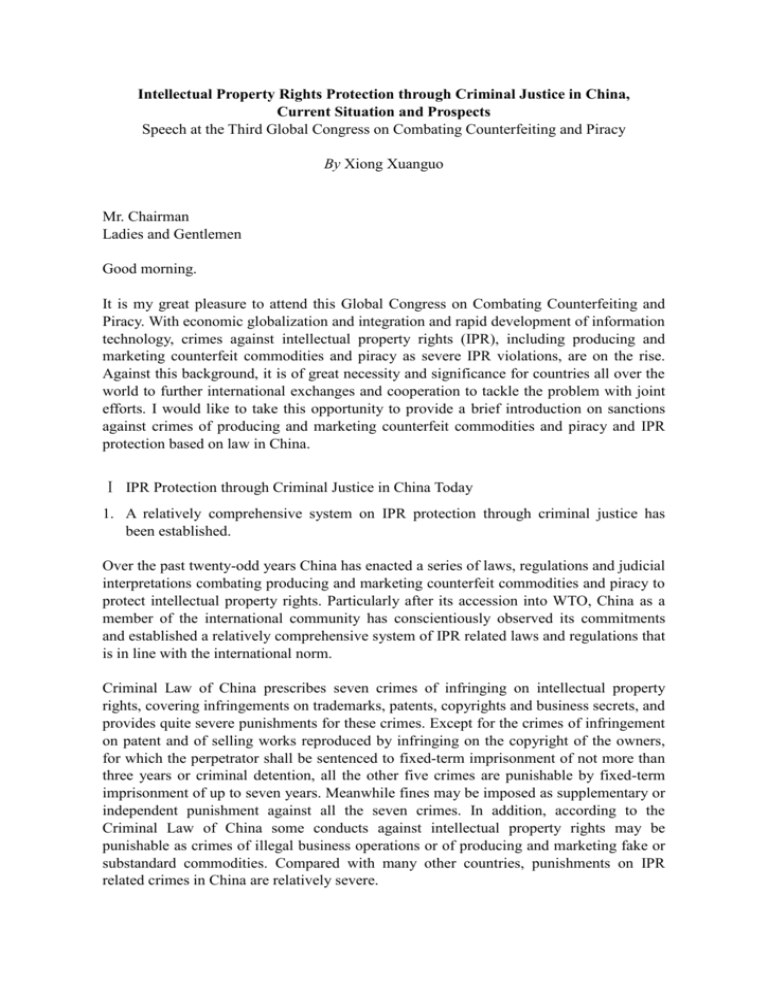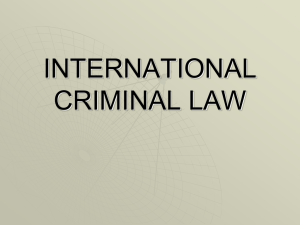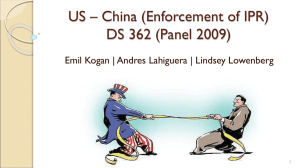Current Situation and Prospect of Intellectual Property Rights
advertisement

Intellectual Property Rights Protection through Criminal Justice in China, Current Situation and Prospects Speech at the Third Global Congress on Combating Counterfeiting and Piracy By Xiong Xuanguo Mr. Chairman Ladies and Gentlemen Good morning. It is my great pleasure to attend this Global Congress on Combating Counterfeiting and Piracy. With economic globalization and integration and rapid development of information technology, crimes against intellectual property rights (IPR), including producing and marketing counterfeit commodities and piracy as severe IPR violations, are on the rise. Against this background, it is of great necessity and significance for countries all over the world to further international exchanges and cooperation to tackle the problem with joint efforts. I would like to take this opportunity to provide a brief introduction on sanctions against crimes of producing and marketing counterfeit commodities and piracy and IPR protection based on law in China. Ⅰ IPR Protection through Criminal Justice in China Today 1. A relatively comprehensive system on IPR protection through criminal justice has been established. Over the past twenty-odd years China has enacted a series of laws, regulations and judicial interpretations combating producing and marketing counterfeit commodities and piracy to protect intellectual property rights. Particularly after its accession into WTO, China as a member of the international community has conscientiously observed its commitments and established a relatively comprehensive system of IPR related laws and regulations that is in line with the international norm. Criminal Law of China prescribes seven crimes of infringing on intellectual property rights, covering infringements on trademarks, patents, copyrights and business secrets, and provides quite severe punishments for these crimes. Except for the crimes of infringement on patent and of selling works reproduced by infringing on the copyright of the owners, for which the perpetrator shall be sentenced to fixed-term imprisonment of not more than three years or criminal detention, all the other five crimes are punishable by fixed-term imprisonment of up to seven years. Meanwhile fines may be imposed as supplementary or independent punishment against all the seven crimes. In addition, according to the Criminal Law of China some conducts against intellectual property rights may be punishable as crimes of illegal business operations or of producing and marketing fake or substandard commodities. Compared with many other countries, punishments on IPR related crimes in China are relatively severe. In order to apply the law properly and correctly handle cases on crimes of IPR violation, the Supreme People’s Court has issued in time relevant judicial interpretations and regulatory documents. On 17 December 1998 the Court issued the Interpretation on Several Issues Concerning Legal Provisions Applied in Criminal Cases on Illegal Publications, specifying the standard of sentencing on crimes against copyright. On 21 December 2004 the Court issued together with the Supreme People’s Procuratorate the Interpretation on Several Issues Concerning Legal Provisions Applied in Criminal Cases on Intellectual Property Rights Infringement (herein after referred to as the Interpretation 2004), specifying the standard of sentencing on the seven crimes of infringing on intellectual property rights and sharply lowering the threshold for criminal liability. On 18 October 2005 the Court and the Procuratorate issued the Reply on Issues Concerning Audio or Video Products Involved in the Criminal Cases on Copyright Violation, specifying the quantitative standard for audio or video products involved in the criminal cases on copyright violation. This month the Supreme People’s Court issued the Opinion on Comprehensively Improving Trials Related to Intellectual Property Rights to Provide Judicial Guarantee for the Development of a Innovative Society, which set a comprehensive plan for the judicatory work concerning all IPR related cases including the criminal ones. These judicial interpretations and regulatory documents with relatively strong practicability are of great significance for the people’s court to hear criminal cases involving intellectual property rights violation in accordance with law, to combat crimes of this kind more effectively and to enhance IPR Protection through criminal justice. It is necessary to point out that according to the law in China, producing and marketing counterfeit commodities and piracy are punished either by administrative or judicial means. There is a distinct line between the administrative punishments and the judicial ones and different laws are applied to impose the punishments based on the gravity of harm done to the society. Administrative punishments may be imposed according to relevant laws and regulations on common IPR violations that are inadequate to be deemed crime, and criminal punishments are imposed in the cases where serious harm has been done to the society and the amount involved in the violation or the loss caused to the victim reaches the threshold for prosecution. It is reasonable to say that criminal legislations on intellectual property rights in China are rather comprehensive and in consistency with Article 61 of TRIPS, which emphasizes providing “for criminal procedures and penalties to be applied at least in cases of willful trademarks counterfeiting or copyright piracy on a commercial scale”. Compared with many other countries, China has an extensive scope of this aspect. 2. China’s judicial institutions duly impose severe punishments according to law against crimes of infringing on intellectual property rights. In recent years China’s government and judicial institutions have constantly intensified IPR protection through criminal justice by severely punishing production and marketing of counterfeit commodities, piracy and other crimes of infringing on intellectual property rights. With these efforts good social results have been achieved. Since the implementation of the Interpretation 2004, the number of IPR related criminal cases has grown rapidly. Statistics shows that in 2005 courts at all levels throughout the country concluded 505 2 cases on crimes of infringing on intellectual property rights, an increase of 31.17% over the previous year. In 2006 the figure rose by 52.28% to 796. In addition, another 1508 cases involving IPR violations were convicted and punished as crimes of producing and marketing fake and substandard products or illegal business operations. This has fully demonstrated the firm position that China takes in combating crimes against intellectual property rights. It is reasonable to say that we have made unprecedented efforts with strong determination in IPR protection through criminal justice and have achieved remarkable progress. ⅡIssues Requiring Further Concern It should be admitted that in some regions IPR violations such as producing and marketing counterfeit commodities and piracy remain an outstanding problem in a handful of fields. One reason is that China’s society and economy have not been highly developed and that its laws and regulations and the environment for law enforcement need further improvement. The other is that difficulties in collecting evidences have affected the number of cases tried. To solve the problem we will adopt the following measures: 1. Duly adjust relevant judicial interpretations to ensure proper enforcement of law According to the characteristics of IPR protection through criminal justice and of the crimes of infringing on intellectual property rights, the Supreme People’s Court has decided to make appropriate supplements and improvements in the Interpretation 2004 so as to give full play to its role of punishing and preventing IPR related crimes. Standard for sentencing on crimes against intellectual property rights such as counterfeiting and piracy will be further improved and unified, suspension of sentence will be applied in a more standardized way and severe punishments will be imposed in accordance with the criminal circumstances and the gravity of harms done. In addition to principal punishments, application and enforcement of fines will be enhanced. More attention will be paid to the approaches depriving the perpetrators of their financial capacities to commit the crimes again, such as forfeiting illegal proceeds and criminal instruments, destroying IPR violating products, ordering the perpetrator to compensate the losses of the victim, etc. Concrete measures will be taken to protect the victim’s right to private prosecution in criminal matters. 2. Further optimize public resources to improve the system of judicial protection on IPR. The Supreme People’ Court is carrying out researches focusing on the “improvement of the system of IPR Protection”. Aiming at facilitating the relevant litigations and trials, optimizing judicatory resources, simplifying procedures of legal remedies and ensuring judicial unification, the Court will put forward scientific solutions and practicable proposals on improving the judicial system protecting intellectual property rights. Furthermore the court will constantly strengthen the supervision and guidance on the trials of cases on crimes of infringing on intellectual property rights in the people’s courts at various levels. A supervision system for cases involving serious crimes of this kind will be set up to ensure that proper punishments be duly imposed according to law. 3. Further enhance the transparency of IPR protection through criminal justice and 3 improve the public awareness on IPR protection. In order to give full play to the role of justice, the Supreme People’s Court has paid particular attention to combining trials based on law with legal publicity. Great efforts have been made in publicizing typical cases on crimes of infringing on intellectual property rights where severe punishments were imposed. In this way both the transparency and social influence of IPR protection through criminal justice have been enhanced. Another important effort to improve the openness and transparency of IPR related trials is to publicize judgments of the relevant cases on line. The Supreme People’s Court issued a notice in March 2006, requiring local courts throughout the country to announce on line convicted cases on IPR related crimes. In April the same year, the Court opened a website on IPR protection, where some documents of judgments were published. The court of China will make more efforts in legal publicity; announce the solemn judgments of the people’s court through press and media by diverse measures including exposing typical cases, disclosing means of crimes and explaining the law through case study, so as to gradually improve the legal awareness of the public on respecting and protecting intellectual property rights, encourage the public to voluntarily fight against IPR related crimes and create a strong social atmosphere for combating crimes of infringing on intellectual property rights. 4. Further the international exchanges and cooperation in IPR protection through criminal justice. As crimes against intellectual property rights are often of a transnational nature, joint efforts of all countries are needed to tackle the problem. Therefore it is necessary to further the international exchanges and cooperation in this aspect. To this end the Supreme People’s Court has made good attempts by conducting cooperation with the World Intellectual Property Organization, European Union, etc. in April 2006, the Supreme People’s Court held jointly with EU in Xiamen, China the Sino-EU High-level Forum on IPR Protection through Criminal Justice. According to the relevant plan, we will organize delegations of judges on intellectual property rights to conduct studies in EU countries. The Supreme People’ Court will conduct professional exchanges with countries experienced in IPR protection, share international experiences and advanced knowledge, trace the trend of development in this field and make timely researches so as to constantly improve the quality of IPR Protection. Ladies and Gentlemen Over a long period, the court of China has been faithfully performing its sacred responsibilities endowed by law, punishing crimes of producing and marketing counterfeit commodities and piracy according to law and protecting the legitimate rights of intellectual property owners and has made remarkable achievements. Same as on the country’s thriving economy, we are fully confident on the prospect of the IPR Protection through criminal justice. With constant improvement in the public awareness on IPR protection, in relevant legislations and in law enforcement, the overall environment for judicial Protection on IPR will surely be constantly optimized. The court of China will continue its faithful performance of its legal responsibilities, strengthen the efforts in IPR 4 protection through criminal justice , improve the efficacy of judicial protection on IPR and endeavour to create a sound legal environment for IPR protection where the rights are duly protected, trials are fair and efficient and criminals are punished without exception. It is known to all that in history the Chinese nation made prominent contributions to human civilization with its wisdom and creativity. In the 21 century when the human civilization is constantly improved, we are convinced and solemnly promise: The Chinese nation respects all fruits of the human civilization; The Chinese nation is capable to protect all human inventions in a society ruled of law; The Chinese nation is undoubtedly able to contribute more to the human society with its own inventions born from a society ruled of law. Thank you. 5





